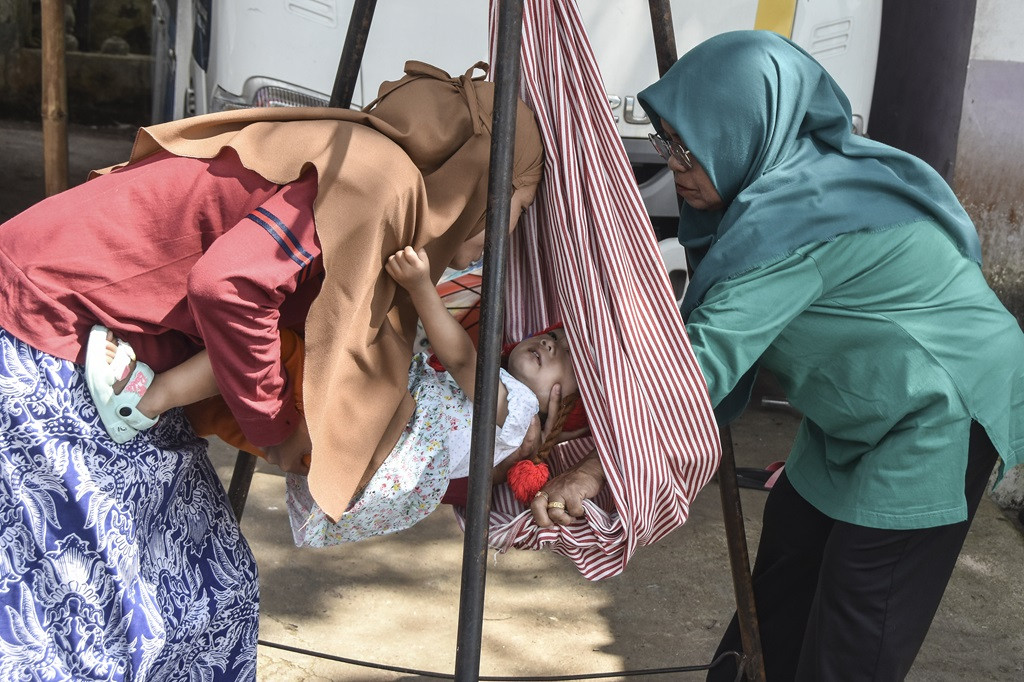Popular Reads
Top Results
Can't find what you're looking for?
View all search resultsPopular Reads
Top Results
Can't find what you're looking for?
View all search resultsParents’ ability to raise children key to preventing stunting
Many processed food manufacturers claim their products can enhance intelligence, endurance, and so on, without providing any evidence
Change text size
Gift Premium Articles
to Anyone
M
any continue to misinterpret what stunting is. "It's okay, every child has their own time to grow," is their common reply when dismissing the fact that their children's growth does not match health standards.
I frequently hear such statements. When seeing that their children's weight does not increase during monthly weight monitoring at integrated health posts (Posyandu) or other health institutions, some parents simply ignore it.
Worse, some parents do not perform routine monitoring because they assume that as long as their children are not sick, there is nothing to worry about.
There are still many parents and caregivers who do not understand the importance of growing their children's weight and height. One of the reasons is that children's weight does not increase alongside age because their food intake is inadequate, which can lead to stunting. Parents should be concerned if their child is not gaining weight.
Neglectful parents are also unaware that stunting has far-reaching consequences for their children's future. Stunted children may have trouble following lessons in the future, be unable to compete with their peers and find difficulties in finding jobs in their productive years.
Wahana Visi Indonesia (WVI) performed an internal stunting baseline study in 13 assisted areas in South Nias, South Bengkulu, Surabaya, Ende, West Manggarai, Manggarai, East Manggarai, Nagekeo, Ngada, Southwest Sumba, Kupang, Central South Timor, Melawi, Sintang and Sekadau in 2022. Conducted on 2,956 children aged 24 to 60 months, the survey found the prevalence rate of stunting was 43.2 percent and underweight was 28.3 percent.
The government has had a stunting prevention communication campaign in place since 2018. There are many programs at the national level with various policies, as well as those implemented at lower levels. Various methods have been used to disseminate programs ranging from raising understanding and modifying behavior connected to stunting, its hazards for children, to prevention.
The First 1,000 Days of Life (1,000 HPK) campaign is one of the most intensive stunting preventive-health promotions. The campaign aims to educate parents and prospective parents on the importance of meeting a child's nutritional needs from the time he or she is in the womb until the age of two years, through exclusive breastfeeding, complementary foods for breast milk in a timely, accurate, safe and correct manner after the age of six months, environmental cleanliness, immunization and monitoring children's growth and development.
The majority of adults in our baseline survey understood the main themes for stunting prevention, but their implementation in the field has failed to live up to expectations. Parents' and caregivers' concepts of stunting prevention frequently contradict actual field conditions such as a lack of adequate food intake, incorrect parenting habits and sickness.
The WVI launched the Pos Gizi program in 2022 with a positive deviation approach to educate parents and caregivers about providing appropriate food intake to underweight children by optimizing local food sources and learning from positive behavior related to feeding and caring for children, as well as the cleanliness of other families around them. This initiative was undertaken in eight previously examined regions.
Parents and caregivers of underweight children are asked to participate in nutrition classes that teach them how to provide food for growth from local food sources, including their gardens. To enhance the consumption of animal protein, nutrition schools are often provided with household food-production programs such as nutritional gardens and small livestock such as catfish and laying hens.
One of the challenges facing the program is that many parents or caregivers substitute manufactured or processed foods with inadequate nutrients. If children eat too many snacks that are low in nutrition and rich in sugar, salt and fat and skip out on big meals with balanced nutrition, they risk becoming malnourished and developing non-communicable diseases.
Many parents are frustrated by the industry's constant advertisement of bad foods. With so many traders aggressively promoting hazardous food, the government must educate manufacturers on the significance of prioritizing the safety and health of children, their primary customers.
Many of them claim their products can enhance intelligence, endurance and so on, without providing any evidence. The government must take immediate measures to raise the producers' and public understanding of children’s need for healthy food.
Educating food producers about tolerable levels of sugar, salt and fat and appropriate nutrition is imperative. However, educating parents on how to care for and raise their children is also essential.
Children's future is in the hands of their parents, the environment, the media and the government. It is our obligation to fulfill our children's nutritional needs, and ensure they receive adequate care, live in a healthy environment, avoid stunting and enjoy optimal physical and cognitive growth.
***
The writer is a maternal child health and nutrition specialist at Wahana Visi Indonesia. The views expressed are her own.










